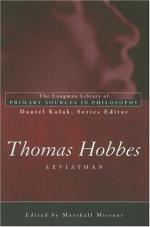|
This section contains 5,738 words (approx. 20 pages at 300 words per page) |

|
SOURCE: "Empirical Psychology—The Nature of Man," in Thomas Hobbes, Archibald Constable & Co Ltd, 1908, pp. 76-101.
In the following excerpt, Taylor explores Hobbes's views regarding humankind's transition from a "state of anarchy into a state of settled order."
We have seen, in the last chapter, what is Hobbes's conception of the 'state of nature,' the condition in which man found himself at the dawn of civilisation, and into which he tends to degenerate when the bonds of political allegiance are gravely relaxed. It is a condition in which the machinery provided by government for the restraint of men's fundamentally anti-social impulses is entirely absent, and in which there is nothing to take its place. How, then, could any number of men ever pass out of this state of anarchy into a state of settled order? Hobbes replies that there is a possibility to escape from the state...
|
This section contains 5,738 words (approx. 20 pages at 300 words per page) |

|


